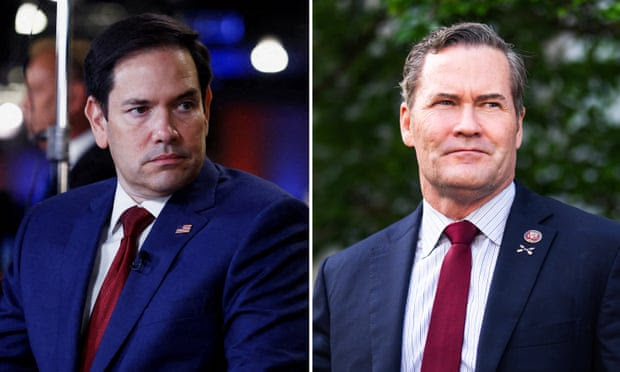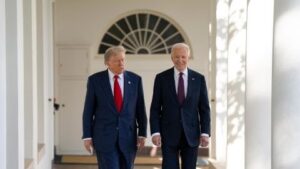
Trump’s Expected Appointments of China Critics Marco Rubio and Mike Waltz Signal a Hawkish Turn—But Is This What America Needs?
With Donald Trump eyeing another run at the White House, there is significant speculation around whom he might bring into his inner circle. Reports suggest he is likely to elevate two of Washington’s most vocal China critics—Senator Marco Rubio and Representative Mike Waltz—to prominent roles in his administration. This possible shift signals a hardline stance on China, but not without controversy. As nationalists celebrate this potential move, others argue that these appointments may push the U.S. further down a path of confrontation with China, risking economic and political fallout.
Rubio and Waltz, long-standing Republican figures, are known for their hawkish views on China. Both have championed legislation targeting Chinese economic and technological influence and have aggressively criticized the Chinese Communist Party (CCP) on issues ranging from human rights abuses to espionage and global trade imbalances. Rubio, for instance, was instrumental in advocating for the Uyghur Forced Labor Prevention Act, while Waltz has consistently supported measures that label the Chinese government as a strategic adversary. Both men have framed U.S.-China relations as a defining challenge of the century, viewing Beijing’s ambitions as a threat to American dominance and global stability.
An Escalation in Hostilities or Necessary Defense?
For Trump, whose administration has already been marked by an “America First” foreign policy, aligning with figures like Rubio and Waltz is not surprising. During his previous term, Trump launched a trade war with China, banned key Chinese tech companies, and sharply restricted Chinese influence in American education, media, and social media. An administration staffed with China hawks would likely amplify these policies.
On one hand, a tough approach to China has its supporters among those who believe the U.S. has long been too lenient. They argue that Rubio and Waltz bring the necessary focus and experience to counter Beijing’s aggression and safeguard U.S. sovereignty. Supporters believe that Rubio’s expertise on foreign affairs and Waltz’s military background equip them to strategize against Chinese influence globally. They view China’s rise as an existential threat, citing the Belt and Road Initiative, China’s influence over key industries, and military expansions in the South China Sea as evidence that Beijing seeks to supplant the U.S. as the dominant global power.
However, critics argue that appointing individuals with Rubio and Waltz’s hardline stance could backfire, escalating tensions rather than diffusing them. China, the world’s second-largest economy and America’s third-largest trading partner, is deeply integrated into the global economy. Aggressive policies could disrupt critical supply chains, further straining the American economy. Technology restrictions on China could hamper U.S. industries reliant on Chinese manufacturing and raw materials, hurting American companies more than Chinese ones.
Human Rights Rhetoric or Cold War Revival?
In framing their hardline stance, both Rubio and Waltz have frequently cited China’s human rights abuses—particularly regarding Uyghurs and other ethnic minorities, as well as crackdowns in Hong Kong—as central issues. Critics, however, question whether these human rights concerns are genuine or are instead being leveraged to justify a confrontational policy toward China. In light of the global “decoupling” movement, which advocates for reducing dependency on Chinese goods, Rubio and Waltz’s anti-China policies are seen by some as thinly veiled attempts to revitalize Cold War-era anti-communist sentiment.
Skeptics argue that while China’s human rights record is indeed troubling, an approach primarily focused on antagonism risks sidelining opportunities for diplomatic engagement, which could otherwise foster positive change. Historically, hardline stances rarely bring meaningful change to authoritarian regimes. Without diplomatic channels, the U.S. risks pushing China further away from democratic ideals and into the arms of other global powers, like Russia or Iran, creating a block of resistance to Western influence.
Is Economic Decoupling Realistic?
If Rubio and Waltz were to guide Trump’s policy toward decoupling from China, it’s unclear how far this policy could realistically go. The American economy is deeply intertwined with China, and a significant portion of U.S. manufacturing depends on Chinese materials and labor. Severing these ties would come at a steep cost, potentially triggering inflationary pressures and disrupting essential supply chains, especially in critical sectors like technology, pharmaceuticals, and renewable energy.
Furthermore, American businesses may face backlash if forced to withdraw from China’s market, the world’s largest in several key industries. Decoupling would require an unprecedented and costly overhaul of global trade networks, all while driving up consumer costs for American households.
Political Divisiveness and Public Sentiment
A Trump administration powered by anti-China hardliners also risks intensifying divisions within the American public. While recent polling shows an increase in negative attitudes toward China among Americans, public sentiment remains divided on how aggressively to approach the issue. Economic decoupling, for instance, is unpopular with businesses, labor unions, and working-class families who rely on affordable goods made in China. Moreover, this approach could alienate Asian-American communities, potentially triggering concerns about racial profiling or discrimination.
While Rubio and Waltz’s expected appointments could appeal to Trump’s base, there’s a real question of whether this would serve the nation as a whole. Are Americans prepared for a prolonged standoff with China? A more aggressive stance might score political points among the conservative electorate, but risks ignoring broader public sentiment that favors stability and a more pragmatic approach to U.S.-China relations.
Conclusion: The Risks and Rewards of a Hawkish Pivot
If Trump does bring Rubio and Waltz on board, it will almost certainly lead to a more aggressive U.S. policy toward China. This could strengthen America’s posture against perceived threats, rallying patriotic support among certain groups. However, the risks—a strained economy, reduced diplomatic engagement, and potential backlash—raise serious questions about the sustainability and desirability of such a confrontational approach.
Is the U.S. truly ready to escalate its rivalry with China, potentially at the cost of economic stability and global goodwill? The American people may soon have to grapple with the consequences of these appointments, weighing national security concerns against the very real costs of a prolonged and intense geopolitical standoff. Only time will tell if such a bold stance will restore American influence—or if it will, ultimately, expose the nation to new vulnerabilities.






